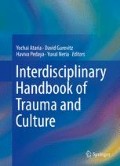Abstract
On March 2, 1988, the then director of the Van Leer Institute, the late professor Yehuda Elkana, published an article in Haaretz, a leading Israeli newspaper, under the title “The Need to Forget” (Elkana, Haaretz.1988;http://www.haaretz.co.il/opinions/1.1841380.). He was referring to forgetting the Holocaust (hereafter, Shoah the Hebrew name of the holocaust will be used). Yehuda’s motivation was undoubtedly complex, as he himself survived Auschwitz, but the essential thrust of his argument was moral or moral-political. He argued that the frequent references to the Shoah in all aspects of Israeli life had become a justification for policies of domination imposed on the Palestinians and for the defiant nationalism that has become familiar. Yehuda’s impassioned plea closed with the following lines: “I do not see any more important political or educational stance for our leaders than to stand up for life… rather than deal, day and night, with symbols, ceremonies and lessons of the Holocaust.” And he added: “The rule of historical remembrance must be uprooted from our lives” (cited in Segev, The seventh million. Hill and Wang; 1993).
Access this chapter
Tax calculation will be finalised at checkout
Purchases are for personal use only
Notes
- 1.
Rudolf Israel Kastner (1906—March 15, 1957) was an Austro-Hungarian-born Jew, Zionist activist, journalist and lawyer. He became known for facilitating the ‘Blood for goods’ proposal which was supposed to help Jews escape Nazi-occupied Hungary during the Holocaust . He was assassinated in 1957 after an Israeli court accused him of having collaborated with the Nazis
- 2.
Moshe Dayan was the Chief of Staff of the Israel Defense Forces (1953–58) and the Defense Minister during the Six-Day War (1967).
- 3.
A miniseries documentary of the Israel Broadcasting Authority (IBA), named after the Pillar of Fire which presents the history and narrative of Zionism from the late nineteenth century until the establishment of the state of Israel in 1948
References
Elkana, Y. (1988 (republished online Oct. 13, 2012)). From “The Need to Forget”. Haaretz. http://www.haaretz.co.il/opinions/1.1841380.
Kenan, O. (2000). Between memory and history. Los Angeles: University of California.
Kulka, O. D. (2013). Landscapes of the metropolis of death: Reflections on memory and imagination. (R. Mandel, Trans.). London: Allen Lane.
Langer, L. (1991). Holocaust testimonies: The ruins of memory. New Haven: Yale University Press.
Mosse, G. L. (1990). Fallen soldiers: Reshaping the memory of the world wars. New York: Oxford University Press.
Segev, T. (1993). The seventh million. New York: Hill and Wang.
Author information
Authors and Affiliations
Corresponding author
Editor information
Editors and Affiliations
Rights and permissions
Copyright information
© 2016 Springer International Publishing Switzerland
About this chapter
Cite this chapter
Friedländer, S. (2016). Some Reflections on Transmitting the Memory of the Holocaust and its Implications, Particularly in Israel. In: Ataria, Y., Gurevitz, D., Pedaya, H., Neria, Y. (eds) Interdisciplinary Handbook of Trauma and Culture. Springer, Cham. https://doi.org/10.1007/978-3-319-29404-9_19
Download citation
DOI: https://doi.org/10.1007/978-3-319-29404-9_19
Published:
Publisher Name: Springer, Cham
Print ISBN: 978-3-319-29402-5
Online ISBN: 978-3-319-29404-9
eBook Packages: Behavioral Science and PsychologyBehavioral Science and Psychology (R0)

